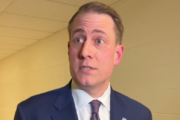WASHINGTON — An environmental group is warning that too much manure is a threat to the Chesapeake Bay, and it wants more standards at the state level.
Each year, Maryland produces enough chicken manure to pile across the field at M&T Bank Stadium, says the group Environment Maryland.
The group released a report on Wednesday saying the problem lies in the phosphorus found in manure, which farmers use to fertilize their fields. When they use too much, the fertilizer can run off and pollute the bay.
“Those nutrients contribute to the dead zones that we see every summer in over a third of the bay,” says Megan Cronin, with Environment Maryland, of the waterway’s oxygen-depleted areas.
Cronin says the state’s current rules allow farmers to continue this practice and her group is pushing for buffer zones and a ban on manure spreading during the winter months. The group says this can be done by processing more manure into pelletized fertilizer and transporting more of it out of the region.
“The bay is dying quicker than we’re saving it,” says State Sen. Roger Manno, D-Mongtomery County. “We have an ideal opportunity here to promulgate some rules and implement some standards.”
A large portion of Maryland’s 296 million broiler chickens are on farms on the state’s Eastern Shore.
Ashley Peterson, vice president of science and technology with the National Chicken Council, says the poultry industry has made significant progress in reducing potential runoff into waterways and that as a result, the Chesapeake Bay Watershed has improved.
“I can tell you that poultry growers in the DELMARVA region are among the national leaders in environmental protection, both in terms of agriculture and society as a whole,” Peterson says. “Farmers follow strict conservation practices and apply poultry litter to fields at agronomic rates allowing for the crops that are planted to take up the necessary nutrients found in the litter.”
WTOP’s Andrew Mollenbeck contributed to this report.
Follow Andrew Mollenbeck and WTOP on Twitter.
(Copyright 2011 by WTOP. All Rights Reserved.)







